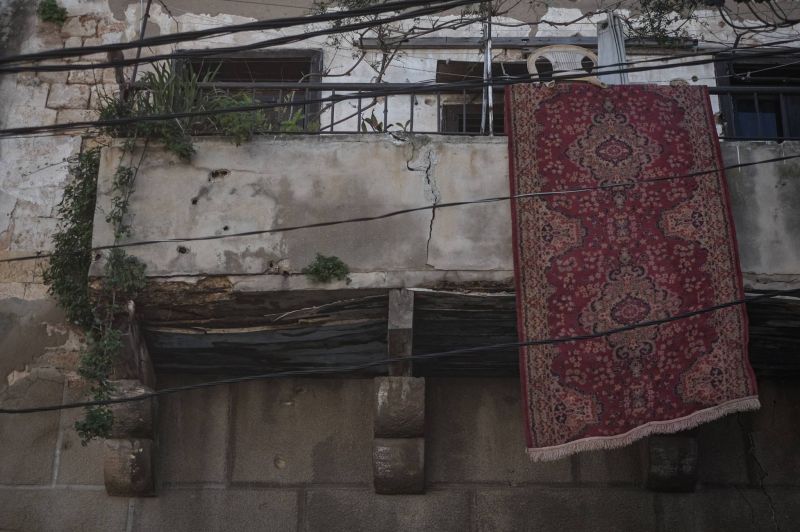
A cracked balcony in Tripoli's historic Mina district, where residents say they are worried about the structural integrity of their homes after a series of earthquakes this week that were felt in Lebanon. Feb. 9, 2023. (Credit: João Sousa/L'Orient Today)
Want to get the Morning Brief by email? Click here to sign up.
State-owned Electricité du Liban on Wednesday announced that bills in accordance with the new tariffs would be issued “by the end of the week,” coinciding with a planned increase in production to supply four hours of power daily, beginning today. The belated bills follow EDL’s previously announced schedule to allow suppliers to collect all overdue bills up to October and will reflect the November implementation of the first public electricity tariff hike in nearly 30 years. New electricity tariffs, billed in dollars, quintuple prices for consumptions under 100 kilowatt-hours (kWh) per month and double the charge for greater consumption. EDL also claimed that the second phase of its improved electricity production plan begins today, upping production to four hours per day. The approval of treasury advances during a controversial cabinet meeting last month allowed EDL to relaunch production in its power plants after weeks of fuel shortage-forced shutdowns. The new electricity tariffs, in addition to financing future fuel purchases, appear among the necessary reforms stipulated by the World Bank to allow Lebanon to receive Jordanian electricity and Egyptian natural gas via Syria.
A seismic expert offered reassurances on Thursday that a tremor felt in Lebanon Wednesday night should not cause alarm, as concern mounted over buildings’ structural integrity following a deadly earthquake in Turkey and Syria on Monday that killed more than 21,000 people. A 4.3-magnitude earthquake erupted from an epicenter in Arsal near the Syrian border Wednesday evening but was felt in different parts of Lebanon. "The tremor felt Wednesday night by the Lebanese remains within the norms of tremors that occur in Lebanon," geologist Samir Zaatiti told L'Orient Today. The Tripoli municipality opened public parks to the area’s residents who, despite the cold weather, fled their homes because they feared their buildings might collapse. Caretaker Interior Minister Bassam Mawlawi on Wednesday reiterated calls for municipalities to survey damages, and “identify leaking and substandard buildings, and landslides on public roads,” after a balcony collapse in Tripoli injured a resident. The president of the Lebanese Association of Property Owners, Andira al-Zouhairi, on Monday warned of an “increased risk of building collapse” exacerbated by inclement weather — which already flooded roads and interrupted telecommunications.
Rescue workers saved another Lebanese citizen from the rubble of a collapsed building in Turkey. Meanwhile, Lebanese disaster relief teams — dispatched to Turkey and Syria in the aftermath of the region’s strongest earthquake in a millennium — shared reports of successful evacuations. Images showed Fadi Habkouk giving a thumbs up while being transported to a field hospital after being extracted by rescue workers from the rubble of the Ozcan Hotel in southern Turkey's Hatay province. The Lebanese embassy in Turkey said two other Lebanese citizens are thought to be trapped at the same location. On Tuesday, rescue workers pulled Mohammad Chamma and his son from a collapsed building in Turkey. Six Lebanese citizens are reported to have died in Turkey and Syria. On Wednesday, Lebanese Fire Brigade chief Maher al-Ajouz shared a video with L’Orient Today of rescue workers pulling a pregnant woman and her daughter from a collapsed building. In Syria, Ali Daher, who is part of the Lebanese rescue team in coastal Latakia, told L'Orient Today that they managed to save a man in his 40s from under the rubble and pull out six bodies. He also said that their next mission would be in Jableh, south of Latakia. A Lebanese ministerial delegation, after a meeting with Syrian president Bashar al-Assad to offer their condolences, announced that Lebanon is ready to open its ports and airports to foreign aid that could be sent to "the Syrian state or any other party."
The Economy Ministry increased Arabic bread bundle prices, Banque du Liban raised its lira-to-dollar exchange platform Sayrafa rate and the lira fell to a new record low on the parallel market yesterday, trading around LL65,000 to the dollar. The prices of small (358-gram), medium (837-gram) and large (1,052-gram) bread bundles increased by LL1,000 each, reaching LL15,000, LL25,000 and LL30,000, respectively. Lebanon continues to subsidize bread bundles, recently approving a multi-million dollar advance to finance wheat imports as the country awaits the first shipment of grain from a World Bank loan. Meanwhile, BDL raised the Sayrafa lira-to-dollar rate — through which central bank Circular No. 161 depositors can convert limited amounts of their lira funds — from LL42,000 to LL43,600, which as of yesterday was around LL22,000 lower than the parallel market rate.
In case you missed it, here’s our must-read article from yesterday: “‘That night’ in 1956: The year the Lebanese ground spoke”
Compiled by Abbas Mahfouz